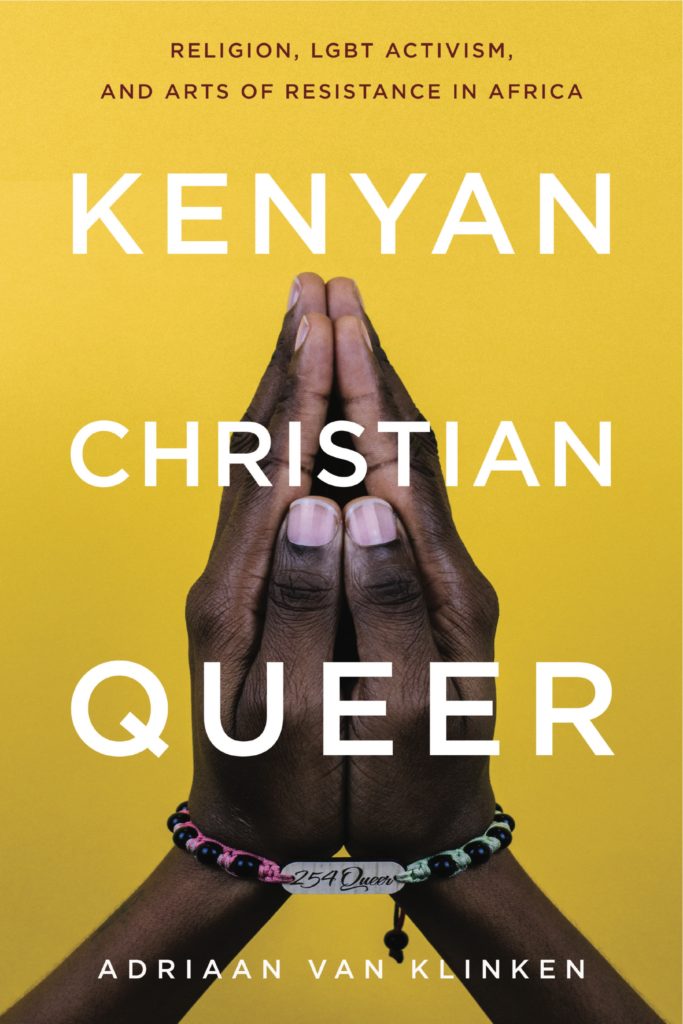 Adriaan van Klinken’s Kenyan, Christian, Queer: Religion, LGBT Activism, and Arts of Resistance in Africa is a boundary-breaking study of queer life in Kenya. In four chapters and four interludes, van Klinken documents the activism of various queer religious actors in Kenya today. The first chapter analyzes the literary figure Binyavanga Wainaina’s critique of colonial Christianity, the second provides a close reading and theological hermeneutics of the 2016 “Same Love” music video by Kenyan hip-hop group Art Attack, the third examines the Story of Our Lives anthology released by a Kenyan art collective, and the fourth provides an ethnographic account of the queer-affirming Cosmopolitan Affirming Church (CAC), which was founded in 2013 in Nairobi.
Adriaan van Klinken’s Kenyan, Christian, Queer: Religion, LGBT Activism, and Arts of Resistance in Africa is a boundary-breaking study of queer life in Kenya. In four chapters and four interludes, van Klinken documents the activism of various queer religious actors in Kenya today. The first chapter analyzes the literary figure Binyavanga Wainaina’s critique of colonial Christianity, the second provides a close reading and theological hermeneutics of the 2016 “Same Love” music video by Kenyan hip-hop group Art Attack, the third examines the Story of Our Lives anthology released by a Kenyan art collective, and the fourth provides an ethnographic account of the queer-affirming Cosmopolitan Affirming Church (CAC), which was founded in 2013 in Nairobi.
While not denying the realities of religiously inspired homophobia in Africa, these case studies challenge the notion that homophobia has led to the disappearance of queer religious life in Africa. Simultaneously, by showing that queer agency in Kenya is expressed in explicitly religious ways, van Klinken also makes the case that liberation need not entail breaking free from religion and into a more secular society, as many queer theorists in the west have claimed. Especially in the last chapter, van Klinken shows the way members of the CAC are reimaging Christianity in ways that challenge the homophobic status quo in Kenyan Christianity. They do this not for pragmatic reasons, on his account, but because their Christian identity is inextricably bound up with their queer identity. To relegate either to the sidelines would be to discount a part of themselves.
Van Klinken’s study is theoretically and methodologically boundary-breaking in at least two interlinked ways: (1) in its crossing of the disciplinary boundaries of anthropology, theology, and religious studies; and (2) in its open acknowledgment that the boundaries between scholar, friend, advocate, and lover are often more malleable than is acknowledged in scholarly works. Breaking these latter boundaries, van Klinken expertly shows, comes with the territory of being an ethnographer who is not sitting at a desk reading about queer religious activists in Kenyan, but is in fact talking with them, learning from them, and getting to know them. The breaking of disciplinary boundaries is linked with this on-the-ground work. For in working with people on the ground, van Klinken shows that the boundaries between theology, religious studies, and ethnography fail to hold. Indeed, these boundaries are the fictions of academic institutions that, while sometimes useful, can quickly become limiting when taken to be rigid boundaries one cannot cross in the field. Van Klinken’s disciplinary boundary breaking here is no doubt also linked to his own identity as a gay man invested in promoting a more just world for queer people in Kenya and beyond. Here again, when working with people on-the-ground, and witnessing their struggles, hopes, and dreams, the boundaries between theologian and disinterested religious studies scholar fail to hold. The result of this boundary breaking is a refreshing analysis that is as erudite as it is honest in its aims.
The contributors to this symposium take van Klinken’s work as jumping off point for further reflections on queer studies, religious studies, Christian theology, and comparison. Ebenezer Obadare reflects on the optimism of van Klinken’s conclusions about a more capacious account of Christianity. He brings his own subjectivity to bear on these conclusions by drawing on his experience of living and working in Nigeria. Sa’ed Atshan engages with van Klinken by comparing and contrasting van Klinken’s work with his own work among queer Palestinian Christians and George Paul Meiu’s study of male sex workers in northern Kenya. Through this comparison he shows that scholars have much to gain from de-centering the western white gaze and instead providing a platform for those outside the west to speak for themselves. Ludovic Lado reflects on the challenges of doing work on homosexuality in Africa and the potential for imaging “queer arts of resistance” amongst African Catholics. Mujahid Osman argues for the importance of challenging assumptions about religion in queer theory, and indeed suggests that religion offers a potential emancipatory site for queer people. Finally, Esther Mombo engages with van Klinken’s theology, drawing on her own work to suggest the faultiness of many of the arguments deployed against same-sex relationships in Kenya, and the continued importance of theorizing the body in any account of queer life.
These reflections, like van Klinken’s book, break boundaries between various disciplines. In doing so, they open up new spaces for imagining the emancipatory possibilities that come with attending to queer religious life in Kenya and beyond. By tracing the faultiness of secular opposition to religion in queer studies, and other forms of humanistic inquiry, they remind us again that the secularization thesis that prophesized the end of religion is indeed one that proves untenable. Further, van Klinken’s book and these essays remind us that such a thesis risks not only misunderstanding religion, but the foreclosing of its liberatory horizons.

